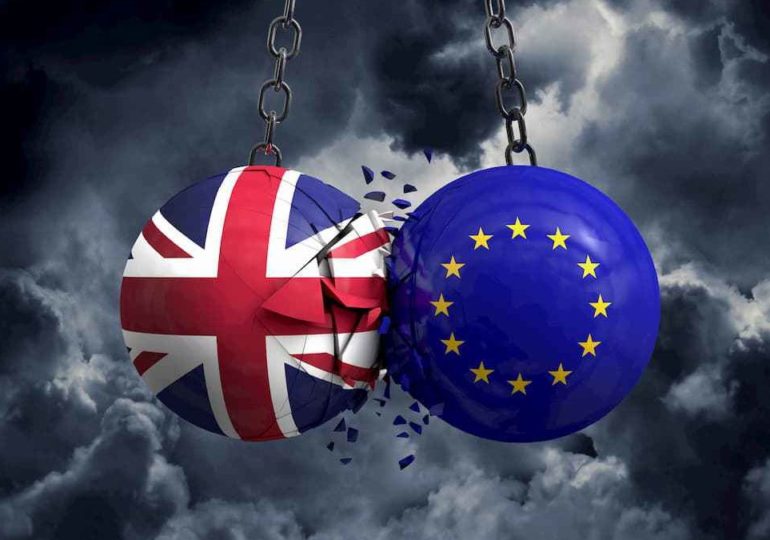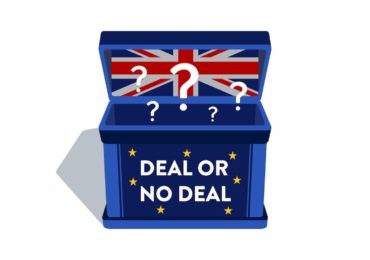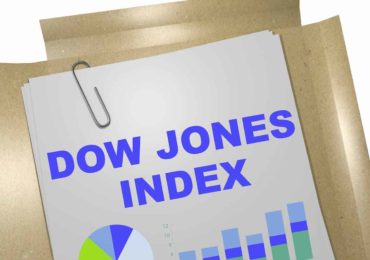Overall Consequences of Brexit
Taking a look at the Brexit consequences, we look to highlight how this decision can affect all parties involved. The referendum on June 23rd 2016 for the United Kingdom to leave the European Union, known as Brexit, is a somewhat controversial topic today, as many have differing opinions on whether or not the decision to leave the European Union is the right one. The United Kingdom has decided that the benefits of being in the unified monetary board, known as the European Union, do not overshadow the cost of free movement of immigration.
Before the appointment of the new UK Prime Minister, Boris Johnson, former UK Prime Minister, Theresa May, submitted the withdrawal notice according to Article 50 to the EU on March 29th 2019. This notice gave the European Union and the United Kingdom until March 29th 2019 to negotiate an agreement. Due to some unsettled agreements, the EU has extended the deadline to October 31st 2019
This Brexit vote obligated three choices on the UK:
- Leave the European Union with no deal, known as “no-deal Brexit”. The outcome of this deal is favoured by the new Prime Minister as well as his supporters. The Prime Minister warned companies to prepare for the result of Brexit because airlines would be grounded, ports would be locked with imported foods, and prescription drugs would run short.
- Carry out another Brexit vote. With all the information passed across on Brexit, polls show that if the citizens of the UK were to be given another chance to take a vote on the subject, they would immediately reject Brexit. This argument was on the basis that voters did not understand the economic difficulties that Brexit would cause. This was an argument that was heightened by Johnson’s political opponents. The European Union Court of Justice then ruled that the UK could cancel the Brexit application anytime without the need for approval from any EU body.
Current Status of Brexit
Former Prime Minister, Theresa May, was replaced by new Prime Minister, Boris Johnson on July 24th 2019. On appointment, Johnson promised to carry on from where Theresa May left off, giving the execution date for Brexit as October 31st, whether or not a deal has been concluded. The likelihood of this happening was further boosted when Queen Elizabeth II accepted Johnson’s request to shut down parliament between September 11 and October 14 to help prevent further opposition from highlighting new Brexit consequences that would prevent the execution of the deal.
The only thing that could have made a no-deal Brexit impossible was the Cooper Bill, and that was already approved in April of this year. There have been preliminary plans by many businesses for a no-deal Brexit, and on February 11th 2019, a bilateral trade agreement was signed by the UK with Switzerland to prevent issues with tariffs in case of a no-deal Brexit.
Consequences of a No-Deal Brexit
The finalisation of the no-deal Brexit means that the UK would no longer be a member of the EU and, consequently, would no longer have trade agreements. This would mean that Britain’s tariff-free trade with other members of the EU would be removed.
This would effectively lead to higher-priced goods in Europe for exporters and a rise in the cost of exports. These tariffs would also affect import prices into the UK because one-third of the food consumed in the UK comes from the EU. There would also be an increase in import prices in the UK leading to inflation and, consequently, a reduced standard of living for residents of the country.
With the implementation of a hard border, all imports must go through customs, and if there is a delay at the border for any reason, there could be food shortages. This would lead to problems as the production of local foods has been hampered by the droughts and heatwaves caused by global warming.
Also, under a no-deal Brexit, travel and trade would become more complicated on the island of Ireland. The country of Ireland would remain with the EU, while Northern Ireland would stay in the United Kingdom. The Prime Minister plans to place a customs border between these two Irish countries. This could possibly reignite the 30-year conflict in Northern Ireland between pro-British Protestants and Catholic Irish Nationalists. This conflict was ended with the promise of never placing a border between Ireland and Northern Ireland. If the implementation of the border stands, many commuters would be forced to go through customs to and from work. For those in Northern Ireland who wish to remain a part of the EU, they could call for a vote to rejoin the country of Ireland.
For the EU, the better option would have been a customs border between Great Britain and Northern Ireland; something the Prime Ministers both past and present rejected. They rejected this option because Britain would have been forced to pay its unsettled bills of $51 billion and also have to find a way to guarantee retained rights for EU citizens living in the UK.
Consequences of a Hard Brexit
A hard Brexit is like a no-deal Brexit but with trade agreements. This, however, is an unlikely Brexit as the possibility of one being negotiated by the October deadline is doubtful. The consequences of a hard Brexit can be tough for the City and its financial centre. This is because companies would no longer use it as an English-speaking entry into the European Union economy.
Many jobs would be lost, with new buildings under construction sitting empty all factors highlighting the Brexit consequences. The prices of houses would start to fall, and many businesses would leave the City as its reputation as a business city would be damaged indefinitely.
The use of state-of-the-art technology available for EU members would definitely be off-limits for the UK, meaning that the privileges of development attached to being an EU member are also going to be lost.
Many companies in the UK would find life difficult as they would lose their ability to bid on public contracts in any country associated with the European Union. Another point that needs to be made is the fact that practitioners in the banking sector would lose their ability to practise in EU member countries.
A hard Brexit would cause employment issues for many of the young workers because, while jobs were readily available before now, these jobs would no longer be available after Brexit. The year following the Brexit vote, many health care professionals quit their jobs, and the number of health care practitioners registering from Europe has reduced by a staggering 90% since then.
The collaboration the UK has with Scotland could be lost as well, as the country would, preferably, join the EU. As we speak, they might even have conducted a vote to leave the UK if a hard Brexit happens.
Brexit Consequences for the EU
The vote for Brexit has already opened the eyes of many anti-immigration parties. If matters stay on their present course, with parties gaining enough ground, an anti-EU vote could be forced. If some countries such as Germany and France left the EU, it would lose its backbone, and this can lead to an eventual crash of the European Union.
Beside this, reports have shown that for a very long time now, even before Brexit, the UK always voted against the EU policies that other members approved, and other nations are optimistic that there will be a new level of cohesiveness if the UK leaves.
Brexit Consequences for the United States
Talking about the Brexit consequences on the United States, they were not left behind.
On the day the Brexit vote was taken, the Dow Jones Industrial Average fell by 610 points, and the Euro fell 2%, as did the pound. The increased value of the dollar had its disadvantages on the US Stock Market, as American shares became too expensive for foreign investors, with the price of gold rising by about 6% at the same time.
That’s not all. The weakness of other currencies to the dollar makes exporting from the US to the UK expensive, affecting the manufacturing and farming sector of the country. This was something that was always in the mind of the US because the highest investors in Great Britain are from the United States, and the completion of the Brexit plan would mean that many companies operating in Europe associated with the UK would nonetheless feel the effect.
With close to $600 billion invested and over a million people employed by the US, many companies feel hard done by by Brexit and have already started looking for alternatives, one of which is opening subsidiary companies in other European countries.
The vote for Brexit takes the UK off the central stage of the financial world and is a vote against globalisation. This creates uncertainty in the UK as the City looks to leave the international market and still retain international customers, which will be hard.
Brexit Consequences for the UK
Talking about the Brexit consequences on the UK, the former Prime Minister had a plan to prevent the free flow of people from the European Union, which was the primary reason she voted for Brexit. The primary concern was due to an increase in refugees from the Middle East and Africa.
The final outcome of Brexit is still unknown even up till now, and this makes the economic state of the country really messy. The growth rate of the UK economy was drastically slowed down by Brexit to 1.3% in 2018. In 2019, it was slowed down by 1.9% and is expected to reduce by 1.6% in 2020. Once Brexit is resolved, the economy is likely to improve by 2% in 2019.
There are plans by the Bank of America to move their European headquarters in the UK down to Dublin, and this will cost a total of $400 million. The largest airline in the UK is transferring ownership to non-British Europeans, and the British pound is 14% lower than before the vote, which helps export but increases import prices. The strength of the pound will increase if a deal is approved.
Many people criticise the plan for Brexit, saying that the consequences far outweigh the cost of staying in the EU, but the UK is bent on going through with the plan. “The Brexit consequences are only a small price to pay for the benefit of the British economy”, says Boris Johnson.
Causes of Brexit
The former Prime Minister, David Cameron, was the one who called for the vote for Brexit in June 2016. He wanted to silence most of the opposition to Brexit within his party. He thought that the vote would put an end to the confusion and swing things in his favour. This argument was, however, won by the anti-EU and anti-immigration parties.
Most people who voted for Brexit are working-class and older residents of the UK, afraid of refugees and immigrants. They felt that the EU was changing what they stood for as a nation, and they did not like the budgetary regulations and constraints imposed on them by the EU. They did not see how they benefited from the free movement of trade and capital.
Those who voted against Brexit were the young members of society in Northern Ireland, London, and Scotland who felt the Brexit consequences would be too hard, and wanted to stay in the EU but were outnumbered by the older populace who came to support the Brexit initiative.
Brexit Plan Summary
The agreement for Brexit had two parts. The first was the non-binding set of principles to help navigate future negotiations and the other was a binding withdrawal agreement.
This plan stated that the UK was to stay within a customs union of the EU for an undetermined period of time. This would allow a trade to continue with both parties, with both sides not having to impose tariffs on each other’s imports.
The UK would have kept complete access to their principles. The European nationals living in the UK would have continued to stay in the UK without the need for working visas, while the other UK citizens would be able to do the same in other EU countries.
The UK would also abide by EU laws and rulings by the European Court of Judgement. But as a non-member of the EU, the UK would no longer have a say on the laws of the EU, which is similar to Norway’s relationship with the EU.
The deal would have kept the UK in a single trade market while restricting immigrants. By doing this, the UK must abide by all EU laws – environmental, social, and customs. The UK would also stop the use of borders between the UK and Northern Ireland.
If the initial deal had been approved by the legislature, then a detailed trade agreement would have been drafted by the UK and the EU, then the declaration would be ruled on by another EU summit, and the European Council must then approve any other plan. With all these hurdles overcome, the UK would copy the EU laws into its law books – they can be amended or revoked at any time.
Bottom Line
The Brexit consequences are factors we only assume based on what we know and the elements on the ground. For all concerned parties, we have to say that we have only mentioned facts; we do not see how things are going to pan out. With the deadline fast approaching, the UK is inevitably bent on making this a reality, probably because they see the light at the end of the tunnel and are not scared of changing things so that they get the results they wish to attain.
Despite many criticisms from some citizens, the EU, and opposing political parties, Prime Minister Boris Johnson has said:
In a bid not to lose our nation and who we are, we have taken these bold steps. Some of you may understand, others not so much. But the fact still remains that we are here for one purpose and one alone, which is to act in the best interest of the people even when they do not see or approve of it. We are heading for a time of difficulty, a time which would define who we are and what we stand for as a nation, so keep the faith because the best is yet to come.
Within the coming weeks, we will definitely know where we stand as a nation with Brexit. This is something our leaders believe will move us in the right direction despite many other opinions suggesting the opposite. In this article, we have talked a lot about the Brexit consequences with facts backing them up. What’s your take on the result of this nation-defining decision?
Please leave a comment below and tell us what you think about Brexit and how it will affect the United Kingdom as well as other involved parties.











